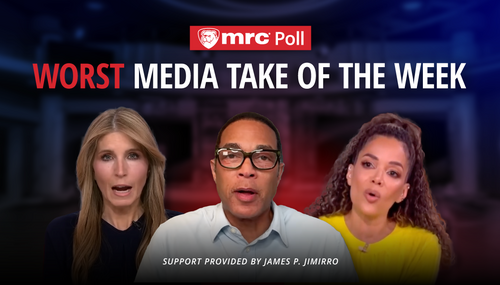 Back in 1999, National Public Radio could only touch Juanita Broaddrick's story of being raped by Bill Clinton in 1978 as a sketchy one-and-done morning story the morning after she was interviewed on Dateline NBC: "There are no witnesses, no police records, no medical records." This, from the network that treated Anita Hill's unproven tale of Clarence Thomas just talking about a porn movie was enough to deny him a spot on the Supreme Court.
Back in 1999, National Public Radio could only touch Juanita Broaddrick's story of being raped by Bill Clinton in 1978 as a sketchy one-and-done morning story the morning after she was interviewed on Dateline NBC: "There are no witnesses, no police records, no medical records." This, from the network that treated Anita Hill's unproven tale of Clarence Thomas just talking about a porn movie was enough to deny him a spot on the Supreme Court.
On Wednesday morning, NPR's Morning Edition suddenly revisited Broaddrick's story as something that wasn't exactly disproved. Morning host Steve Inskeep brought on longtime Hillary Clinton spokesman Phillippe Reines to discuss his attack on Sen. Kirsten Gillibrand (D-N.Y.), who turned on the Clintons and said Bill should have resigned in the wake of the Lewinsky scandal.
STEVE INSKEEP: OK. She waited a long time to speak out. But this is actually something that is said about a lot of victims of sexual harassment or sexual assault. Maybe they wait 30 or 40 years.
PHILIPPE REINES: Well, but let's not conflate what happened here. Senator Gillibrand was not speaking about some event that happened to her...
STEVE INSKEEP: Understood. Exactly.
PHILIPPE REINES: No. But she should not be put in the same basket of people who have found the strength and the courage, after being silenced and stifled after - whether it's a year or five years, 20 years or, in the case of Roy Moore, 40 years.
Isn't that Clintonesque? Women who have "found the strength and the courage" to accuse Roy Moore are to be honored, but Democrats should never believe women who accuse the Clintons? Reines insisted that somehow, because independent counsel Kenneth Starr didn't file rapes charges against a sitting president, Clinton was pretty much innocent:
STEVE INSKEEP: Now, Gillibrand was talking about Monica Lewinsky, who was a White House intern when she had the relationship with President Clinton. There's also a woman who accused Clinton of rape back in the 1970s, Juanita Broaddrick, who initially denied that Clinton had assaulted her but then said that he had. And he appeared the other day - she appeared the other day on Fox News with Laura Ingraham. Let's listen to just a little bit of that.
JUANITA BROADDRICK: I think it's too dangerous to bring this back up again. They do not want to hear from us, Laura. And that's the crux of the matter. They do not want our names to be brought up again.
INSKEEP: OK. Now, let's note President Clinton denied the accusations through his lawyer. But aren't we in this new atmosphere where people are insisting we should be much more likely to believe accusers?
PHILIPPE REINES: Well, I would separate out what happened with President Clinton for a very simple reason. What's happening now is, again, people who are making accusations that they felt they couldn't make - either they were silenced or they were stifled. They worried about retribution. There was no reckoning for the people who they made accusations against, and there was no punishment. Bill Clinton is about the last person you can put in that category.
This man is seriously oily. Clinton's accusers didn't feel stifled? Clinton's accusers weren't worried aboiut retribution? Everyone had seen Clinton get elected in 1992, and more seriously, in 1996, after the charges moved from adultery to sexual harassment. The Democrats and the media who lauded Anita Hill trashed Paula Jones as a "Dogpatch Madonna" and moved on. But Reines just suggested Broaddrick's claims were "looked at" and dismissed:
REINES: President Clinton went through pretty much the greatest investigation of his personal life of all time, and that included Juanita Broaddrick. Like you said, this is something that was looked at. And there are two words that I think really distinguish what went on during impeachment and what's happening now. And those words are Ken Starr. You had just about the last person in the world who was ever going to give him a pass on anything.
INSKEEP: OK. So he was investigated thoroughly, and he was impeached and put on trial and lost his law license, all of which was about lying under oath in the Paula Jones deposition.
REINES: But the reason why it was not...
INSKEEP: But that wasn't really about Juanita Broaddrick, was it?
REINES: Well, that's because Ken Starr had decided that there was nothing there. The facts, as I understand them, is that she in multiple occasions - which you alluded to - said there was no assault, that nothing happened. And Ken Starr, again, who left no stone unturned, came to the same conclusion.
INSKEEP: In a couple of seconds, is this case then closed for you?
REINES: You know, I think this is an example of a case that's been thoroughly looked at. Something not being proven is not the same as something not being taken seriously.
NPR broadcast only one report on Morning Edition on February 25, 1999 -- the day after the Dateline NBC interview by Lisa Myers. The bizarrely titled evening newscast All Things Considered (and Totenberg) did not file a report at the time. And here was how NPR suggested the story wasn't very believable:
BROOKE GLADSTONE: The hotel where the alleged crime took place no longer exists. There are no witnesses, no police records, no medical records. And there are further complications. Broaddrick declined to come forward when approached by a Clinton opponent, Dwight Yoakam [sic -- it was Phil] in 1992, and early last year when asked to testify in the Paula Jones sexual harassment case, Broaddrick signed an affidavit supplied by the White House affirming that the allegations concerning her own sexual assault were false. Sometimes, Broaddrick told Myers, she would wake up convinced she ought to speak out.
JUANITA BROADDRICK: I would get up sometimes in the morning and I would think, `It's the thing to do. I'm going to do it.' Then by nighttime I'd think, `That could bring no good whatsoever to my life.'
BROOKE GLADSTONE: Later, when independent counsel Kenneth Starr approached her with a promise of immunity from a perjury charge, Broaddrick recanted her denial, though she insisted she was never pressured, threatened or bribed by the White House to lie. In her interview last night, Broaddrick's demeanor was somber and credible, but the incident she purports to recount occurred too long ago to prosecute and cannot be proven. She says she never intended to sue. But last night, Broaddrick did put her case before the public, seeking an end, she says, to the questions, the rumors and the spin.
Inskeep could have grilled Reines more seriously by quoting Broaddrick's accusation that Hillary pressured her to say nothing:
"[Hillary] came directly to me as soon as she hit the door. I had been there only a few minutes, I only wanted to make an appearance and leave. She caught me and took my hand and said 'I am so happy to meet you. I want you to know that we appreciate everything you do for Bill.' I started to turn away and she held onto my hand and reiterated her phrase -- looking less friendly and repeated her statement — 'Everything you do for Bill'. I said nothing. She wasn't letting me get away until she made her point. She talked low, the smile faded on the second thank you. I just released her hand from mine and left the gathering."




